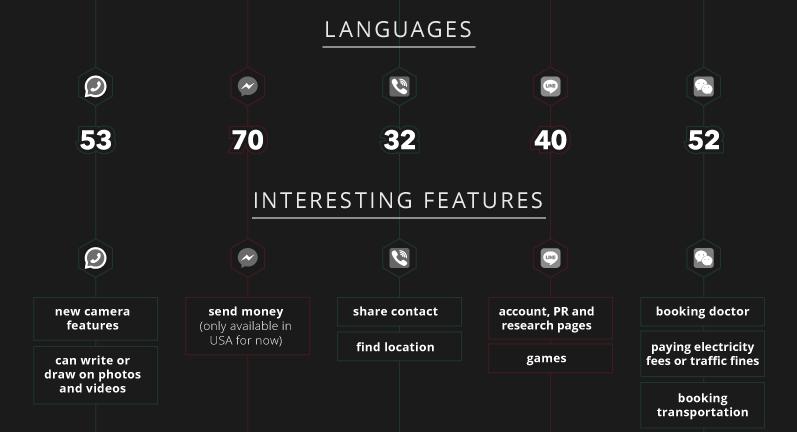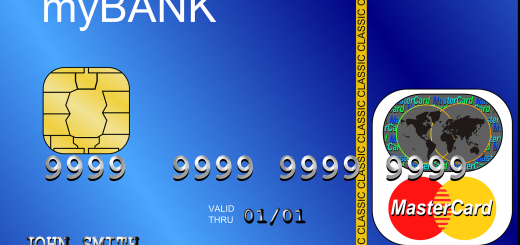Which Messaging App Do You Use?
Colin Cieloha from Skilled.co shared an infographic on the five biggest messaging apps in the world: WhatsApp, Facebook App, Viber, Line, and WeChat. Skype, for some reason, was not included on the list. Quick research shows that Skype had 560 million users back in 2009, and it has definitely gotten bigger, not to mention better, since then.
I use Facebook Messenger for most domestic situations, but WhatsApp for many of my international needs, like with my friends in Chile and my daughter in Argentina. But my question to you is, which one do you use?
Here’s a little bit of information provided by Skilled.co about each company.
Launched in 2010 in the United States, WhatsApp was invented by Jan Koum and Brian Acton, who created the app after they were rejected for jobs at Facebook. As of 2016, there are over 1 billion users in the world, most of them are regularly active on WhatsApp every month.
The app is popular in countries such as Brazil, Mexico, Russia, and India. It is available in 53 languages. WhatsApp has a group chat capacity of 256 people and is available on Android, iOS, Windows phones, BlackBerry, Nokia, and Mac/PC.
Facebook Messenger
One of the most used components of the social media giant, Facebook Messenger was developed by Facebook creator Mark Zuckerberg and David A. Marcus. As of 2016, there were 1 billion users of the Facebook Messenger app, and the user growth rate is the highest among the five apps, with 50 million users signing up every month.
The popularity of the Facebook Messenger app is at its peak in Australia, Canada, the U.S.A., France, and the UK. The app is available in the highest number of languages among the five apps, with 72 local versions. Facebook Messenger also offers instant games in 30 countries and has a group chat capacity of 150.
Viber
Originating in Israel and released in December 2010, Viber was invented by the former chief information officer in the Israeli army, Talmon Marco. The app has 800+ million registered users, but unlike WhatsApp and Facebook Messenger, only about a quarter of them use the app on a monthly basis. The monthly growth rate of the app is 10 million.
Some countries where Viber is very popular include Belarus, Moldova, Ukraine, Iraq, Sri Lanka and Libya. The app is available in 32 languages and allows users to share their contacts and find their location. Viber has a group chat capacity of 200 and is available on multiple platforms including Apple iOS, Android, Windows Phone, Blackberry, Bada, Symbian, MacOS, and Microsoft Windows.
Line
Launched in March 2011, Line is a Japanese messenger app that was initially developed by the engineers of NHN Japan after the Tohoku earthquake had damaged the telecommunication network of the country. As of 2016, the app has about 700 million users and 220 million of them use it on a monthly basis.
Line is popular in Japan but has not become a staple in any other regions, even though it is available in 40 languages. The app actually offers more features than some of the competition, as it allows users to send video files, have free VoIP conversations, and get access to various statistics. The Line messenger app has a group chat capacity of 50.
Launched in January 2011 in China, WeChat was developed by Zhang Xiaolong and it has 1.1 billion users worldwide. From these countries, approximately 818 million use the app every month. WeChat is a huge success in China, Iran, and Japan, and it grows with 14.67 million registered users per month. The app is available in 52 languages and it features some interesting perks you do not get with the other apps. These perks include booking a doctor, booking transportation, and paying electricity fees or traffic fines.
WeChat has a group chat capacity of 100 and users can also use it for conference calls of up to 9 people. Just like Facebook Messenger, WeChat offers an outside app SMS feature, but in this case, the function is not restricted to Android users. Platforms on which WeChat is available, include Android, iOS, BlackBerry, Nokia Asia, Windows Phones, Microsoft Windows, MacOS platforms and Firefox OS.
The traditional SMS text messenger has become rather obsolete over the last years, in the light of the explosion of messaging apps. This is because messaging apps offer enhanced flexibility and a wealth of functions that make it easy to keep in touch with friends and family from all over the world for little or no cost. The messaging apps market is set to continue to grow and offer users more and more options for easy personal and business communication.
I remember making a phone call from a pay phone on Christmas Day in 1985 from Chile to the United States to my family and friends. It cost more than $80 and we could barely hear each other! Of course, back then there were no cell phones or internet to send emails or jump onto Skype. The quality and costs of communication and messaging technologies have improved greatly over the last thirty years thanks to competent app developers like those mentioned in this article. Hopefully, you already use one if not a couple of these valuable resources.




